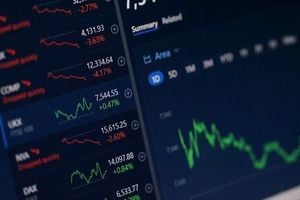The DeepSeek AI app has taken the tech world by storm since its global launch at the start of January 2025. Just weeks after its release, the app has reportedly captivated millions of users, racking up over 16 million downloads within the first 18 days, according to Sensor Tower research. This rapid ascent not only eclipsed previous benchmarks set by leading platforms but also placed it atop the charts of both Apple’s App Store and Alphabet Inc.’s Android Play Store, cementing its status as one of the fastest-growing AI applications.
Developed by a burgeoning Chinese startup, DeepSeek boasts its impressive capabilities and low developmental costs, reportedly built for under $6 million. These figures sent shockwaves through the market, particularly impacting shares of chipmakers Nvidia and Broadcom. Their stocks plummeted by roughly 17% following the app's revelations, erasing upwards of $800 billion from market capitalization. Such cost-effective development has raised competitive alarms within the U.S. tech sector, prompting discussions on the necessity of innovation at all levels.
Significant figures within the tech industry have weighed in on DeepSeek’s swift rise. "We have to run harder, run faster, have an all-country effort," stated Alex Karp, CEO of Palantir, during interviews focusing on the competitive field of AI. Microsoft’s CEO, Satya Nadella, similarly commended DeepSeek for its "real innovations," affirming the pressure it places on traditional paradigms of development.
OpenAI CEO Sam Altman did not shy away from mentioning the challenges presented by DeepSeek, stating at recent events, "This is a reminder of the level of competition and the need for democratic AI to win." His peers echoed this sentiment, emphasizing collaboration and accelerated innovation to stay competitive. Even Tim Cook, CEO of Apple, shared his perspective during the company’s earnings call, asserting, "Innovation driving efficiency is good"—a nod to the sense of urgency DeepSeek has introduced to the industry.
While many celebrate DeepSeek’s breakthrough, others express caution. Governments and private firms are beginning to tread carefully, with reports surfacing about hundreds of organizations blocking the app as part of precautionary cybersecurity measures. These developments come as the U.S. Navy and Congress ban the usage of DeepSeek for their employees, with Italy’s data protection authority instructing Apple and Google to remove the app over privacy concerns.
Beyond the immediate business ramifications, DeepSeek's emergence has ignited broader discussions on regulatory frameworks for AI technologies globally. Experts warn of the potential consequences of deploying such advanced models without sufficient oversight, adding layers of complexity to the app's adoption. The concerns include not just cybersecurity but also the ethical dimensions of AI usage.
Despite the setbacks, many tech leaders maintain optimism. Mark Zuckerberg, CEO of Meta, characterized the situation as complex, acknowledging, "It’s probably too early to really have a strong opinion on what this means for infrastructure." His statements reflect the sentiment among industry leaders to avoid hasty conclusions, preferring to analyze the long-term impacts on AI technology.
Interestingly, some reports suggest the costs of creating DeepSeek may be inaccurately represented. Research firm SemiAnalysis posited estimates significantly higher than $500 million over its operational history. Such discrepancies contribute to the debate surrounding the legitimacy of DeepSeek's rapid success and the sustainability of its business model.
Nevertheless, the rising competition orchestrated by DeepSeek brings to light the ever-evolving nature of AI technology. Leaders across the ecosystem are now challenged to reassess their strategies and investments, with companies like Meta pledging significant capital for AI infrastructure. Zuckerberg has indicated Meta's intention to invest between $60 billion and $65 billion by 2025 to revolutionize its AI capabilities.
With such investments, it’s clear the race is on. Technology giants have begun rethinking their positions, not purely based on numerical performance, but also on the broader philosophical approaches to development. With DeepSeek's global launch, the AI race reflects not only competitive but also national capacities related to tech sovereignty.
Looking forward, the narratives surrounding DeepSeek will likely demand the attention of regulators worldwide. The intersection of breakthrough technologies and public trust will shape the future directives for AI legislation and oversight. One thing is for certain—DeepSeek's presence has catalyzed significant conversations about both the benefits and perils of AI advancements.
The app has become more than just a product; it stands at the crossroads of innovation, competition, and regulation, perhaps serving as the wake-up call for the U.S. tech sector to refocus its efforts, ensuring it not only leads but also secures its technological heritage against the backdrop of international competition.



